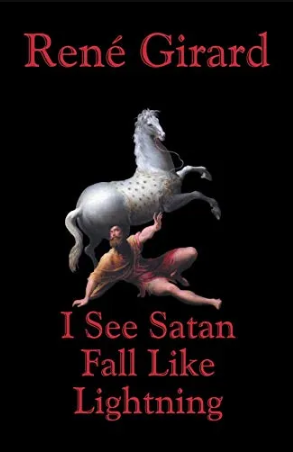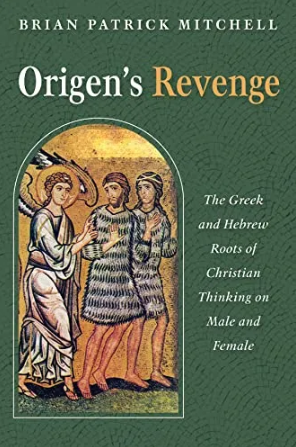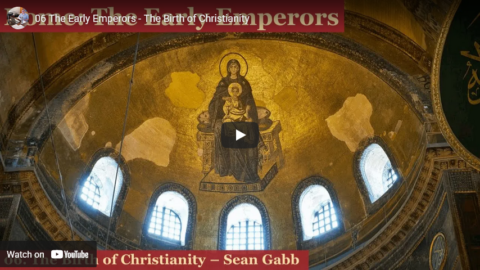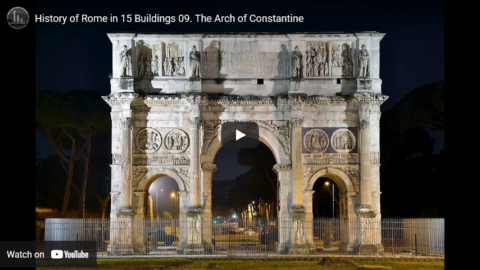seangabb
Published 28 Aug 2024The Roman Empire had a geographical logic, but was an endlessly diverse patchwork of linguistic, ethnic and religious groups. In this lecture, Sean Gabb describes the diversity:
Geographical Logic – 00:00:00
Linguistic Diversity – 00:06:57
Italy – 00:12:46
Greece – 00:17:23
Greeks and Romans – 00:21:01
Egypt – 00:28:24
Greeks, Romans, Egyptians – 00:33:00
North Africa – 00:37:27
The Jews – 00:41:20
Greeks, Romans, Jews – 00:44:10
Gaul – 00:50:36
Britain – 00:52:26
Greeks, Romans, Britons – 00:54:58
The East – 00:59:22
Bibliography – 01:01:20
(more…)
February 28, 2025
Everyday Life in the Roman Empire – An Empire of Peoples
July 12, 2024
They’ll confidently claim they’re merely “anti-Zionist“
James Pew on the disturbing rise of antisemitism in all western nations that got turbocharged by the October 7 atrocities by Hamas terrorists against Israeli civilians on the Gaza border:

“Student encampments – UofT – Camping at the university” by Can Pac Swire is licensed under CC BY-SA 2.0 .
Jew hatred in this country, and around the world, is something I completely miscalculated. Like so many others, including many Jewish people, I naively thought that antisemitism was a thing of the past. Or at least, it was something that had been greatly diminished to the extent that it ceased to be much of a problem. Tragically, I was wrong about this.
The global expansion of Islamo-fascism and the mixing of pro-Jihadism with leftist critical social justice activism, is something I also, similarly, underestimated.
When I think of October 7th I am overcome with disgust and sadness. The world should be aligned with Israel, and aggressively opposed to Palestine/Hamas (Hamastinians) and the corrupt United Nations Relief and Workers Agency (UNRWA). That in many cases it appears to be the other way around, that many political leaders, media, and insufferable celebrities support Hamas’ terrorist aspirations, their evil nonsensical movement to wipe Israel off the face of the planet, is something that is incomprehensible to me.
In one of the late Rex Murphy’s final National Post columns, he proclaimed that “Hatred of Israel is the great moral disorder of our time”. Placing the blame for the “red-ignorant core” of the post-October 7th rise in antisemitism on “woke campuses”, Rex wrote the following concerning the legitimacy of the state of Israel:
Dear Israel is but a spit of earth on a huge globe. Three years after six million Jews were put to torture, humiliation, whippings, rape, medical experiment, starvation, and vile death, was it not surely time — time for all the nations of the Earth who had reached some moral understanding of life and government — to allow Jewish people time to rest, time to mourn, time to see what and who might be left of them.
While I’m the first to admit that no nation, including Israel, is beyond criticism, I feel there is both a time and place, and an appropriate proportionality that should be reflected in a fair critical analysis of any nation. When Douglas Murray made the point at the recent Munk debate that no serious person ever questions the legitimacy of the nation of Pakistan — a nation founded in a way similar to Israel — like they question and challenge the legitimacy of Israel, so-called anti-Zionists claimed that the audiences’ embrace of Murray’s logic was simply evidence of their Islamophobia.
Murray expanded on his Pakistan/Israel comparison by asking the audience to imagine someone who feels that Pakistan is not legitimate and therefore should not exist at all. Imagine also, that this person holds no antipathy directed at the Pakistani people. Preposterous! Yet the anti-Zionists ask us to believe this in regards to Israel. The anti-Zionist will look you straight in the eyes, and with all the sincerity in the world, express their belief that Israel should not exist, and absurdly, implore this does not mean they hate Jews (the majority of Israelis). Why in the case of an analogy where Pakistan is at stake, is it so clear which position is the correct and moral one? Alternatively, why are such questions involving Israel so difficult to answer?
In Canada, the increase in antisemitism has been going on for years. Record levels of antisemitism were recorded in 2021, with dramatic increases in Quebec and British Columbia.1 B’nai Brith Canada reported the number of antisemitic incidents across the nation more than doubled from 2022 to 2023, now reaching an unprecedented high.2
In February of 2024, Global Media reported that “Homes, businesses, schools, places of worship, neighbourhoods and institutions have all been targeted in what community leaders are calling an unparalleled spike in hate crimes against Jews”. And the Toronto Police warned the following month that “56% of reported hate crimes in 2024 have targeted Jewish people”.3
None of this distracts Canadian Islamists, like Younus Kathrada, from what they feel are the important social issues. Kathrada has been known to the government’s Integrated Terrorism Assessment Centre since at least 2020.4 He preaches to his Islamic followers in British Columbia, “I want our children to understand this well: the non-Muslims are the enemies of Allah, therefore they are your enemies”.5
June 26, 2024
Lord Balfour
Arthur Lord Balfour, Conservative Prime Minister from 1902 to 1905, is perhaps best known for the Balfour Declaration issued during World War 1 that established the formal goal of an independent homeland for the Jews in the Holy Land. Who was he? Barbara Kay’s essay originally published in the Dorchester Review was recently reposted at Woke Watch Canada:
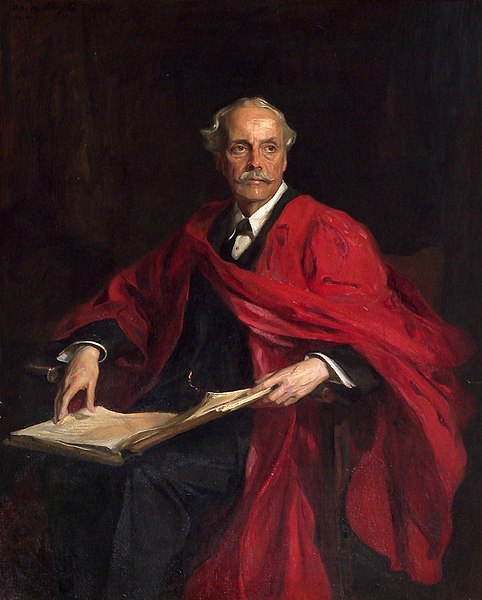
“Arthur James Balfour, 1st Earl of Balfour, KG, OM, PC, Prime Minister and Philosopher” portrait in oil by Philip de László, 1914.
From the Trinity College collection via Wikimedia Commons.
Why was the aristocrat Lord Balfour, the social antithesis of this humble Jew from the Pale of Russia, so taken with Weizmann’s vision that he was willing to expend political capital and exert so much effort to see it realized? Who was Balfour? What was he?
Arthur James Balfour was born at his family seat, Whittingehame, in East Lothian, the “granary of Scotland”. A forebear had made a fortune in India in military materials, so he was financially secure for life, and socially connected at the highest levels.
Having lost his father when he was 7, Balfour was lucky in his mother, a strong-willed and educated woman who, according to Mrs Dugdale, inculcated the idea of duty as “the uncompromising foundation of his character”. He attended Eton and Cambridge, where he was described by a friend as “a man of unusual philosophy and metaphysics”, who could hold his own with the Dons (professors), “some of them men of undoubted genius”. He was devoted to his extended family, and much beloved by his nieces and nephews.
In his essay “Arthur Balfour: a Fatal Charm”1 cultural critic Ferdinand Mount cites “nonchalance” as Balfour’s defining trait. Legendarily indolent, he rarely rose before 11 a.m., claimed never to read newspapers, and disdained the ritual schmoozing of fellow backbenchers expected by his peers in the Members’ Smoking Room. Mount says he was “indifferent to what his colleagues, the public or posterity thought of him or his policies”.
This loftiness — echoed in his unusual physical height — was perceived as admirable or maddening according to the observer and circumstances. Churchill said of him: “He was quite fearless. When they took him to the Front to see the war, he admired the bursting shells blandly through his pince-nez. There was in fact no way of getting to him.”
His self-sufficiency was no act. Sports-mad, he skipped lunch with the Kaiser to watch the Eton and Harrow cricket match, and when in Scotland might play two full rounds of golf a day (his handicap of 10 was better than P. G. Wodehouse and about the same as thriller writer Ian Fleming’s).
Balfour sounds from my description so far as if he was something of a playboy, but that is a very partial portrait. He was also known as “Bloody Balfour” for his readiness to endorse police action and his apparent indifference to their cost.
The Irish loathed him. In 1887 he became personal secretary for Ireland under his uncle, Lord Salisbury, just in time to enforce the Coercion Act against the volatile Irish Land League. Indeed, Balfour’s parliamentary critic William O’Brien saw him as a man who harboured a “lust for slaughter with a eunuchized imagination” who took “a strange pleasure in mere purposeless human suffering, which imparted a delicious excitement to his languid life”.
One hopes this accusation of actual sadism is an exaggeration of Balfour’s indubitable detachment. Yet indifference to human life is certainly not an uncommon charge laid against intellectuals for whom ideas loom larger in their claims to attention than the fate of those beyond their particular tribes.
For balance, we have Barbara Tuchman’s assessment:
Balfour had a capacious and philosophical mind. Words to describe him by contemporaries are often “charm” and “cynicism”. He had a profound and philosophic mind, he was lazy, imperturbable in any fracas, shunned detail, left facts to subordinates, played tennis whenever possible, but pursued his principles of statecraft with every art of politics under the command of a superb intelligence.
Fortunately for his temperament, Balfour’s life circumstances had landed him at the centre of a genuinely intellectual circle. His brothers in-law, for example, were Lord Rayleigh, who became head of the Cambridge Laboratory and won the Nobel Prize for Physics, and Henry Sidgwick, the Cambridge philosopher who with his wife Elaine Balfour founded Newnham College.
Politically, Balfour enjoyed both dramatic success and dramatic failure. He led the Unionist Party longer than anyone before him since Pitt the Younger. And he was a minister longer than anyone else in the 20th century, including Winston Churchill. Balfour was the only Unionist who was invited to join Asquith’s first war cabinet, and continued as foreign secretary after the coup that brought Lloyd George to power.
As Churchill put it: “He passed from one cabinet to the other, from the prime minister who was his champion to the prime minister who had been his most severe critic, like a powerful, graceful cat walking delicately and unsoiled across a rather muddy street”.
One of Balfour’s teachers at Eton described him as “fearless, resolved and negligently great”. On the other hand, Mount tells us, “indecisiveness” was his bane. He would stand paralyzed in the mezzanine of his London home agonizing over which of the matching staircases to descend by. He could love — the great love of his life died after an unreasonably long engagement — but, allegedly too staggered by the loss of his almost-fiancée, he never married.2 He could not be pinned down politically on many issues, a matter of great frustration to his colleagues, and this cost him dearly. As Mount notes, his charm was indisputable, “but more than charm he would not give” and “in the end, the charm is all that remains.”
Balfour fought three general elections as party leader and lost them all. His premiership lasted less than four years and ended in a Liberal landslide in 2006, a great electoral humiliation in making him the only prime minister in the 20th century to lose his own seat. He did not seem greatly to repine at the rejection, though, and it is thanks to the loss that he had time to further his education on the Zionist movement.
1. Mount, Ferdinand, English Voices (2016), pp 358 ff.
2. One suspects that even if May Lyttleton had lived, Balfour would have avoided marrying her on some pretext or other. There is no evidence that Balfour was a closeted homosexual, but he may have been asexual. He enjoyed an “amitié amoureuse” with (married) Mary Elcho for 30 years involving little or nothing in the way of sex, after which she wrote to him, “I’ll give you this much, tho, for although you have only loved me little, yet I must admit you have loved me long”.
March 9, 2024
The Jewish Avengers Who Hunted Nazi Murderers
World War Two
Published Mar 8, 2024In March 1945, the first Jewish unit in the Allied forces reaches the frontline. Before fighting the Nazis, the men spent years battling against the policies of the British government. After the war, they will take vengeance on the perpetrators of the Holocaust and join the Zionist movement in building and fighting for Israel.
(more…)
February 15, 2024
Israel as an “Eschatological Garrison State”
Big Serge outlines why Israel was compelled by its geostrategic position to react as strongly as possible to the October 7th atrocities along the southern border with Gaza:

“Israeli flag, Tel Aviv, Star of David” by Tim Pearce, Los Gatos is licensed under CC BY 2.0 .
It is almost impossible to find a dispassionate analysis of the Israeli-Arab conflict, simply because it sits directly upon a concatenation of ethno-religious fault lines. Palestinians are the object of concern for many of the world’s nearly two billion Muslims, particularly in the Arab world, who tend to view Gaza’s suffering and humiliation as their own. Israel, on the other hand, is a subject of rare agreement between American evangelicals (who believe that the nation state of Israel has relevance to Armageddon and the fate of Christianity) and the more secular American governing blob, which treats Israel as an American outpost in the Levant. To this, we can add the emerging religion of anti-colonialism, which views Palestine as something like the next great liberation project, akin to ending apartheid in South Africa or Gandhi’s campaign for Indian independence.
My goal is not to convince any of the aforementioned people that their views are wrong, per se. Instead, I would like to argue that, despite these many powerful emotional-religious currents, much of the Israeli-Arab conflict can be understood in fairly mundane geopolitical terms. Despite the enormous psychological stakes that billions of people have in the subject matter, it still unfolds itself to a relatively dispassionate analysis.
The root of the problems lay in the peculiar nature of the Israeli state. Israel is not a normal country. By this, I mean neither that it is a special, providential country (as an American evangelical might say), nor that it is a uniquely wicked root of all evil. Rather, it is extraordinary in two important ways that relate to its function and geopolitical calculus, rather than its moral content.
First, Israel is an Eschatological Garrison State. This is a particular form of state which perceives itself as a sort of redoubt against the end of all things, and accordingly becomes highly militarized and highly willing to dispense military force. Israel is not the only such state to have existed in history, but it is the only obvious one extant today.
A historical comparison may help explain. In 1453, when the Ottoman Empire at last overran Constantinople and brought an end to the millennia-old Roman imperium, early medieval Russia found itself in a unique position. With the fall of the Byzantines (and the previous schism with western papal Christianity), Russia was now the only Orthodox Christian power remaining in the world. This fact created a sense of world-historic religious siege. Surrounded on all sides by Islam, Roman Catholicism, and Turko-Mongol Khanates, Russia became a prototypical Eschatological Garrison State, with a high degree of cooperation between Church and State and an extraordinary level of military mobilization. The character of the Russian state was indelibly formed by this sense of being besieged, of being the last redoubt of authentic Christianity, and the consequent need to extract a high volume of manpower and taxes to defend the garrison state.
Israel is much the same, though its sense of eschatological terror is of a more ethno-religious sort. Israel is the only Jewish state in the world, founded in the shadow of Auschwitz, besieged on all sides by states with which it has fought several wars. Whether this justifies the kinetic aspects of Israeli foreign policy is not the point. The simple fact is that this is Israel’s innate self conception. It is an eschatological redoubt for a Jewish population that sees itself as having nowhere else to go. If one refuses to acknowledge the central Israeli geopolitical premise — that they would do anything to avoid a return to Auschwitz — one will never make sense of their actions.
January 14, 2024
Tristin Hopper imagines the thoughts of the Toronto Police Service
Every week, Tristin Hopper helps us understand an element of the week’s news by “imagining” the diary entries of the people or organizations involved. This week, it’s the turn of Toronto’s police department:
The Toronto police have not had a good week. After receiving widespread criticism for refusing to disperse an anti-Israel blockade targeting a north Toronto Jewish neighbourhood, video emerged this week of officers delivering coffee and donuts to the blockaders.
And so, only after a cross-section of local politicians and Jewish leaders had expressed bafflement at police inaction, did Toronto police announce plans on Thursday to actually put a stop to protests at the Avenue Road bridge. They even charged one protester with incitement of hatred for allegedly carrying a hate group’s flag at a protest in downtown Toronto.
Monday
I’m sorry — is that the sound of people wanting us to enforce the law? As in, “hey there, sworn peace officer, get in your car, go identify some criminality and use force to stop it?”Are you sure about that, Toronto? You sure you don’t want us to instead try fixing this with a solidarity flag raising? Or maybe this is something that could be diffused with one of those equity roundtables you keep forcing us to attend.
After all, enforcing the law is a messy business. People could get hurt. This isn’t like handing out a traffic ticket or a jaywalking citation: You’re asking us to confront people who may not care that their actions are illegal, and may employ additional illegal methods to dispute that.
Tuesday
I’m still trying to get my head around this new paradigm. So to refresh: when people break laws, you want us to stop that? The Criminal Code. The Highway Traffic Act. The Controlled Substances Act. You want our officers to read up on contemporary legislation, seek out violators of said legislation, and then apply appropriate sanctions?This is a minefield, frankly. We’re talking raised voices. Mean tweets. People in handcuffs. Unflattering videos. Outraged Toronto Star columns. This is how we board an escalator that may soon make us pine for the days when our only problems were an easily ignored minority demographic having their overpass shut down.
Wednesday
When we’re enforcing these laws, are you absolutely sure you want us to do this without first checking if they’re politically acceptable? I mean, it would obviously streamline everything if roadways were only ever blockaded by white supremacist cannibal pedophiles, but that’s rarely the case.And what if they’re doing an illegal thing that is tangentially related to something you like? I had our legal guy look into it and he said that any laws broken as a result of a public protest are still illegal – the right to protest only covers legal things, it turns out. So bear with me; this could result in a city in which graffiti, blockades and vandalism OF ANY KIND could end up banned. It’s a slippery slope.
November 18, 2023
“René Girard’s famous book I See Satan Fall Like Lightning isn’t directly about Barack Obama being the Antichrist”
At Astral Codex Ten, Scott Alexander reviews I See Satan Fall Like Lightning by René Girard:
The phrase “I see Satan fall like lightning” comes from Luke 10:18. I’d previously encountered it on insane right-wing conspiracy theory websites. You can rephrase it as “I see Satan descend to earth in the form of lightning”. But “lightning” in Hebrew is barak. So the Bible says Satan will descend to Earth in the form of Barak. Seems like a relevant Bible verse for insane right-wing conspiracy theorists!
Philosopher / theologian Rene Girard’s famous book I See Satan Fall Like Lightning isn’t directly about Barack Obama being the Antichrist. It’s an ambitious theory-of-everything for anthropology, mythography, and the Judeo-Christian religion. After solving all of those venerable fields, it will, sort of, loop back to Barack Obama being the Antichrist. But it’ll do it in such an intellectual and polymathic Continental philosophy way that can’t even get mad.
Girard’s starting point is the similarity between Bible stories and pagan myths. You’ve heard about this before — dying-and-resurrecting gods, that sort of thing. You might expect Girard, a good Catholic, to reject these similarities. He doesn’t. He says they’re real and important. Pagan myths resemble the Bible because they’re both describing the same psychosocial process. The myths are distorted propaganda supporting the process, and the Bible is a clear-eyed description of the process which reveals it to be evil. Just as worshipful Soviet hagiographies of Stalin and sober historical analyses of Stalin will have many similarities (since they’re both describing Stalin), so there will be unavoidable resonances between myth and the Bible.
Girard calls this process “the single-victim process” or “Satan”. It goes like this:
- Most (all?) human desire is mimetic, ie based on copying other people’s desires. The Bible warns against coveting your neighbor’s stuff, because it knows people’s natural tendencies run that direction. It’s not that your neighbor has particularly good stuff. It’s that you want it because it’s your neighbor’s. Think of two children playing in a room full of toys. One child picks up Toy #368 and starts playing with it. Then the other child tries to take it, ignoring all the hundreds of other toys available. It’s valuable because someone else wants it.
- As with the two children, conflict is inevitable. As the mimetic process intensifies, everyone goes from complicated individuals with individual wants, to copies of their neighbors (ie their desires copy their neighbors’ desires, and they become the sort of people who would have those desires). Alliances form and dissipate. There is a war of all against all. The social fabric starts to collapse.
- Instead of letting the social fabric collapse, everyone suddenly turns their ire on one person, the victim. Maybe this person is a foreigner, or a contrarian, or just ugly. The transition from individuals to a mob reaches a crescendo. The mob, with one will, murders the victim (or maybe just exiles them).
- Then everything is kind of okay! The murder relieves the built-up tension. People feel like they can have their own desires again, and stop coveting their neighbors’ stuff quite so hard, at least for a while. Society does not collapse. If there was no civilization before, maybe people take advantage of this period of relative peace to found civilization.
- (Optional step 5) Seems pretty impressive that killing one victim could cause all this peace and civilization! The former mob declares their victim to be a god. Killing the god was the necessary prerequisite to civilization. Now the god probably reigns in heaven or something. Maybe they die and resurrect every year. Whatever.
- Rinse and repeat.
Girard is against this process. Not just because it involves violent mobs lynching innocent people (although it does), but because that step perpetuates the whole cycle: people greedily desiring whatever their neighbors have, people hating their neighbors, internecine war of all against all. He dubs the process Satan, based partly on the original Hebrew meaning of Satan as “prosecutor”. Satan is the force that tells people that the victim is guilty and deserves to be lynched.
(and did you know that Paraclete, the Greek word for the Holy Spirit, originally meant “defense attorney”? The Paraclete is the force that — no, we’ll get to that later).
Are all myths and Bible stories really about this process? Girard says yes. For example, consider the myth of Oedipus. Around the end, Thebes is stricken by plague (Girard says plagues should usually be interpreted metaphorically as social plagues, ie discord). Everyone goes to the oracle and asks for a solution. The oracle says that someone has killed his father and married his mother, and the plague won’t end until that person is removed. It is revealed that Oedipus is the culprit. The mob expels Oedipus from the city, and the plague ends.
Okay, that’s one myth. Are there others?
November 2, 2023
With progressive allies like these …
In The Free Press, Suzy Weiss and Francesca Block record the reactions of progressive Jews who are waking up to discover that their “allies” hate them and want them dead:
After Donald Trump was elected, Emily Rose, 51, flew to New York with her daughters to walk in the Women’s March. She demonstrated on the streets of Minneapolis, where she lives, in the days after George Floyd’s murder. She donated money to small, black-led movements and social justice organizations that she believed in. She unlearned and then re-educated herself, as white Americans were instructed to, and read the teachings of anti-racist scholars like Ta-Nehisi Coates.
But then, after the massacre in Israel on October 7, when some 1,400 Jews were brutally murdered, not to mention the rapes, beheadings, and instances of torture, Rose began to notice something odd from the cohort of fellow progressives she admired: they were cheering for the other side.
“I started to see these intelligent, educated people, whose mission is to make our system better for people of color, suddenly posting all this anti-Israel, pro-Palestinian stuff,” Rose said. “I’m not changing my values, but screw the allyship. I will not stop fighting, because I believe in the causes themselves. But as for going out of my way to support, to post, to give money? I’m done.”
While professional politicos, like DSA founder Maurice Isserman, are publicly stepping down from their parties and denouncing organizations that justify, or even cheer, the events of October 7, and wealthy Jewish donors claw back their millions from elite universities that they say helped foment antisemitism on their campuses, there’s a quieter, more personal reckoning happening among progressive Jews. Like Rose, they feel betrayed by a left that they thought would have their backs.
Dov, 30, a Canadian musician who didn’t want to share her last name for privacy reasons, is transgender and a self-proclaimed “political progressive”. Since October 7, she says, “Every time I open Instagram I’m just like, blocking or deleting people that I thought I knew.” She calls anti-Zionism “cloaked antisemitism”.
Josh Gilman, 37, who lives in Arizona and prides himself on having friends across the political spectrum, says he has been muting even close friends who espouse anti-Zionist views. “I don’t need the emotional distress,” he told The Free Press. “If there’s someone who is truly my friend, it makes me feel that they very much don’t understand who I am as a person.” He’s cut out people he had invited to dinner at his home, and who he had trusted around his family and children.
“There’s a line in the sand, which is Israel,” he said.
Nate Clark, 34, lives in Virginia. He’s marched for gay rights, and in 2020, for the removal of statues of Confederate soldiers in his home state. He said his choice to stand up for others is rooted in his Jewish identity.
“As a Jew, I feel like it would be weird if I went to Germany and took a right turn down Hitler Avenue or saw a statue of Eichmann, and then hear people claim ‘Oh, it’s our history. We’re just proud of our history’?” he told me.
Since October 7, he’s found himself “politically homeless”.
September 20, 2023
Christian views on men and women
The most recent book review from Mr. and Mrs. Psmith discusses Brian Patrick Mitchell’s Origen’s Revenge: The Greek and Hebrew Roots of Christian Thinking on Male and Female:
The following is an email exchange between the Psmiths, edited slightly for clarity.
John: You know dear, we’ve been writing this book review Substack for eight months now, ever since that crazy New Year’s resolution of ours, but we still haven’t done “the gender one”. And I feel like we have a real competitive advantage at this, since both sides of the unbridgeable epistemic chasm between the sexes are represented here. So let’s settle some of the eternal questions: Can men and women be friends? Who got the worse deal out of the curse in the Garden of Eden? And what’s up with your abysmal grip strength anyway?
I was perplexed by these and other questions, but then I picked up this book on the theology of gender, and it all got a lot clearer. The author is Deacon Brian Patrick Mitchell, an Eastern Orthodox clergyman and retired military officer. In a previous life, Mitchell testified before the Presidential Commission on the Assignment of Women in the Armed Forces and then followed that up with a book called Women in the Military: Flirting with Disaster, so he’s been interested in the differences between men and women for a while.
People have been observing for centuries that Christianity can be a little bit schizophrenic on the subject of gender relations. From the earliest days of the Apostolic era, there are two strains in evidence within Christianity: one which shores up the gender divisions common to most agricultural societies, and another which radically transcends them. Oftentimes both strains are visible within a single person! Thus you have the Apostle Paul on the one hand saying in his letter to the Ephesians:
Wives, submit yourselves unto your own husbands, as unto the Lord. For the husband is the head of the wife, even as Christ is the head of the church: and he is the saviour of the body. Therefore as the church is subject unto Christ, so let the wives be to their own husbands in every thing. (Ephesians 5:22-24)
But then in Galatians:
There is neither Jew nor Greek, there is neither bond nor free, there is neither male nor female: for ye are all one in Christ Jesus. (Galatians 3:28)
For as long as Christianity has existed, there have been people emphasizing one of these tendencies as the “true” Christian message on gender while attempting to minimize the other. Sometimes these arguments are interesting and sometimes they bring out something important (I’m a fan of Sarah Ruden’s Paul Among the People on the one side, and of Toby Sumpter’s fiery homilies on the other), but I think in both cases they’re falling into the error of trying to simplify something that is actually complicated. There’s a certain kind of person who can’t handle inconsistency, and that kind of person is going to have trouble with Christianity, because to a finite being the products of an infinite mind will sometimes appear inconsistent. Does Christianity want women to be subject to men, or does it want men and women to transcend their natures? The answer is very clearly both.
Mitchell’s book is compelling because it doesn’t try to minimize or hide one of these tendencies, but acknowledges up front that they’re both there and both have to be struggled with. It then advances the novel (as far as I know) argument that these two tendencies with regard to gender relations actually reflect the two major ethnic and cultural influences on the early Church: Hebrew and Greek.
The ancient Hebrew attitudes towards male and female are apparent from the beginning of the Bible: God creates Eve from out of Adam’s rib, and she is called Woman because she was taken out from Man. Thus the woman is subordinated to the man, yet fundamentally made of the same stuff as him. God calls the division of humanity into men and women good, He blesses families and helps barren women conceive, He commands His people to be fruitful and to multiply, and He promises Abraham that his seed shall be numbered as the stars of heaven. The entire Old Testament is a story of families, sometimes dysfunctional families, but families nonetheless, as opposed to lone men roaming the earth as in the Iliad or Bronze Age Mindset. Male headship is assumed, but it’s also assumed that men are fundamentally incomplete without something that only women can give them: a home, a future, and the thing that makes both, children.
So in Mitchell’s telling, the Hebrew legacy is responsible for the more “trad” side of early Christianity. What about the Greeks? Well we already discussed in our joint review of Fustel de Coulanges’ The Ancient City how ancient Greek society was basically the world of gangster rap: honor, boasting, violence, women as trophies, women as a way of keeping score, women torn wailing from the arms of their parents or husbands and forced into marriage or concubinage or outright slavery. You will be shocked to learn that this culture did not hold a high opinion of women, procreation, or the marital union. Greek philosophy is a massively complicated and diverse beast, but there’s a strong tendency within it to associate women with physicality, nature, and brute matter, and to disdain all of these things in favor of rationality, spirit, and the intellect (all coded as male).
Our readers are probably thinking, “Hang on a minute, I thought the Hebrews were the patriarchal ones, do you mean to say that the hyper-masculine and hyper-misogynistic culture was the one that decided maleness and femaleness didn’t matter?” Well yes I do, and it’s pretty easy to see why if one hasn’t been totally brainwashed by modernity, but maybe it’ll be more convincing if a woman explains it to them.
Jane: Well, I think you gave a pretty accurate description of actually-existing ancient Greek culture, but we have to remember that the Church Fathers weren’t classicists poring through the corpus trying to accurately characterize the past. Rather, they were men of late antiquity, mostly educated in a “Great Books” canon heavy on the classical philosophy — and the worldview of philosophers is often quite different from the general norms and presuppositions of their society as a whole. (Not that modern — by which I mean post-1600 — classicists have always recognized this; E.R. Dodds’s The Greeks and the Irrational is considered a seminal work of classical scholarship precisely because it undercuts a long tradition of taking the philosophers as representative of their culture rather than in conflict with it.)1 So the direct influence on early Christians wasn’t the world Fustel de Coulanges describes (which covers roughly the Greek Dark Ages through the Archaic period), but the texts of the period that came after, as interpreted by an even later era. It’s a bit like looking at our contemporary small-l liberals, who draw heavily on a tradition that rose out of Enlightenment philosophy, which in turn was an outgrowth of and/or reaction to the medieval and early modern worlds: they’re not not connected to all that, but Boethius is not going to be the most helpful context for reading Rorty. You should probably look at Locke instead.
1. Bonus, and shorter, Dodds: “On Misunderstanding the Oedipus Rex“, which you probably do too.
May 2, 2023
QotD: The musical importance of the city of Córdoba
Which city is our best role model in creating a healthy and creative musical culture?
Is it New York or London? Paris or Tokyo? Los Angeles or Shanghai? Nashville or Vienna? Berlin or Rio de Janeiro?
That depends on what you’re looking for. Do you value innovation or tradition? Do you want insider acclaim or crossover success? Is your aim to maximize creativity or promote diversity? Are you seeking timeless artistry or quick money attracting a large audience?
Ah, I want all of these things. So I only have one choice — but I’m sure my city isn’t even on your list.
My ideal music city is Córdoba, Spain.
But I’m not talking about today. I’m referring to Córdoba around the year 1000 AD.
I will make a case that medieval Córdoba had more influence on global music than any other city in history. That’s probably not something you expected. But even if you disagree — and I already can hear some New Yorkers grumbling in the background — I think you will discover that the “Córdoba miracle,” as I call it, is an amazing role model for us.
It’s a case study in how communities foster the arts — and in a way that benefits everybody, not just the artists.
[…] a thousand years before New Orleans spurred the rise of jazz, and instigated the Africanization of American music, a similar thing happened in Córdoba, Spain. You could even call that city the prototype for all the decisive musical trends of our modern times.
“This was the chapter in Europe’s culture when Jews, Christians, and Muslims lived side by side,” asserts Yale professor María Rosa Menocal, “and, despite their intractable differences and enduring hostilities, nourished a complex culture of tolerance.”
There’s even a word for this kind of cultural blossoming: Convivencia. It translates literally as “live together.” You don’t hear this term very often, but you should — because we need a dose of it now more than ever. And when scholars discuss and debate this notion of Convivencia, they focus their attention primarily on one city: Córdoba.
It represents the historical and cultural epicenter of living together as a norm and ideal.
Even today, we can see the mixture of cultures in Spain’s distinctive architecture, food, and music. These are both part of Europe, but also separate from it. It is our single best example of how the West can enter into fruitful cultural dialogue with the outsider — to the benefit of both.
Ted Gioia, “The Most Important City in the History of Music Isn’t What You Think It Is”, The Honest Broker, 2023-01-26.
March 29, 2023
QotD: Sacrifice
As a terminology note: we typically call a living thing killed and given to the gods a sacrificial victim, while objects are votive offerings. All of these terms have useful Latin roots: the word “victim” – which now means anyone who suffers something – originally meant only the animal used in a sacrifice as the Latin victima; the assistant in a sacrifice who handled the animal was the victimarius. Sacrifice comes from the Latin sacrificium, with the literal meaning of “the thing made sacred”, since the sacrificed thing becomes sacer (sacred) as it now belongs to a god, a concept we’ll link back to later. A votivus in Latin is an object promised as part of a vow, often deposited in a temple or sanctuary; such an item, once handed over, belonged to the god and was also sacer.
There is some concern for the place and directionality of the gods in question. Sacrifices for gods that live above are often burnt so that the smoke wafts up to where the gods are (you see this in Greek and Roman practice, as well in Mesopotamian religion, e.g. in Atrahasis, where the gods “gather like flies” about a sacrifice; it seems worth noting that in Temple Judaism, YHWH (generally thought to dwell “up”) gets burnt offerings too), while sacrifices to gods in the earth (often gods of death) often go down, through things like libations (a sacrifice of liquid poured out).
There is also concern for the right animals and the time of day. Most gods receive ritual during the day, but there are variations – Roman underworld and childbirth deities (oddly connected) seem to have received sacrifices by night. Different animals might be offered, in accordance with what the god preferred, the scale of the request, and the scale of the god. Big gods, like Jupiter, tend to demand prestige, high value animals (Jupiter’s normal sacrifice in Rome was a white ox). The color of the animal would also matter – in Roman practice, while the gods above typically received white colored victims, the gods below (the di inferi but also the di Manes) darkly colored animals. That knowledge we talked about was important in knowing what to sacrifice and how.
Now, why do the gods want these things? That differs, religion to religion. In some polytheistic systems, it is made clear that the gods require sacrifice and might be diminished, or even perish, without it. That seems to have been true of Aztec religion, particularly sacrifices to Quetzalcoatl; it is also suggested for Mesopotamian religion in the Atrahasis where the gods become hungry and diminished when they wipe out most of humans and thus most of the sacrifices taking place. Unlike Mesopotamian gods, who can be killed, Greek and Roman gods are truly immortal – no more capable of dying than I am able to spontaneously become a potted plant – but the implication instead is that they enjoy sacrifices, possibly the taste or even simply the honor it brings them (e.g. Homeric Hymn to Demeter 310-315).
We’ll come back to this idea later, but I want to note it here: the thing being sacrificed becomes sacred. That means it doesn’t belong to people anymore, but to the god themselves. That can impose special rules for handling, depositing and storing, since the item in question doesn’t belong to you anymore – you have to be extra-special-careful with things that belong to a god. But I do want to note the basic idea here: gods can own property, including things and even land – the temple belongs not to the city but to the god, for instance. Interestingly, living things, including people can also belong to a god, but that is a topic for a later post. We’re still working on the basics here.
Bret Devereaux, “Collections: Practical Polytheism, Part II: Practice”, A Collection of Unmitigated Pedantry, 2019-11-01.
July 1, 2022
The Early Emperors – Part 6: The Birth of Christianity
seangabb
Published 27 Dec 2021The Roman Empire was the last and the greatest of the ancient empires. It is the origin from which springs the history of Western Europe and those nations that descend from the Western Roman Empire. It is the political entity within which the Christian faith was born, and the growth of the Church within the Empire, and its eventual establishment as the sole faith of the Empire, have left an indelible impression on all modern denominations. Its history, together with that of the ancient Greeks and the Jews, is our history. To understand how the Empire emerged from a great though finally dysfunctional republic, and how it was consolidated by its early rulers, is partly how we understand ourselves.
Here is a series of lectures given by Sean Gabb in late 2021, in which he discusses and tries to explain the achievement of the early Emperors. For reasons of politeness and data protection, all student contributions have been removed.
More by Sean Gabb on the Ancient World: https://www.classicstuition.co.uk/
Learn Latin or Greek or both with him: https://www.udemy.com/user/sean-gabb/
His historical novels (under the pen name “Richard Blake”): https://www.amazon.co.uk/Richard-Blak…
June 20, 2022
June 16, 2022
Secret Foods of the Spanish Inquisition
Tasting History with Max Miller
Published 15 Feb 2022Support the Channel with Patreon ► https://www.patreon.com/tastinghistory
Merch ► crowdmade.com/collections/tastinghistory
Instagram ► https://www.instagram.com/tastinghist…
Twitter ► https://twitter.com/TastingHistory1
Tiktok ► TastingHistory
Reddit ► r/TastingHistory
Discord ► https://discord.gg/d7nbEpy
Amazon Wish List ► https://amzn.to/3i0mwGt
Send mail to:
Tasting History
PO Box 766
Burbank, CA 91503LINKS TO SOURCES**
A Drizzle of Honey by David M. Gitlitz and Linda Kay Davidson: https://amzn.to/3gyf0CY
The Spanish Inquisition by Henry Kamen: https://amzn.to/3B9EbVXRECIPE
1 cup (160g) dried fava beans
1 cup (180g) dried chickpeas
2 1/2 lbs or 1kg beef
¼ cup (60ml) Olive oil
1 tablespoon salt
1 large onion diced
1 quart (1L) beef broth or water
2 teaspoon ground coriander
1 1/2 tsp ground cumin
2 teaspoon ground caraway
2 teaspoon fresh ground pepper
2 Eggplant, peeled and chopped
A large handful of chard leaves1. Coat the eggplant in salt, cover, and set aside for several hours.
2. Boil the fava beans and chickpeas in a large pot for 2 minutes, then drain and set aside. In the same pot, heat half of the olive oil over medium heat then, add the onions and half of the salt and cook until lightly brown, about 8 minutes. Remove the onions and add the beef to the empty pot with the rest of the oil and salt. Cook until lightly brown, about 5 minutes. Add the onions back in as well as the beef broth/water. Bring to a simmer and cover, letting the stew simmer for 1 hour.
3. Drain and rinse the eggplant, then add it into the pot along with the fava bean, chickpeas, and spices. Cover and let cook for another 2 hours.
4. Chop the chard, then pound it flat with a rolling pin, and add it into the pot. Set the pot into the oven at 200°F and cook overnight (or at least 6 hours). Alternately, you can transfer the adafina to a slow cooker overnight. Serve alone or over rice.**Some of the links and other products that appear on this video are from companies which Tasting History will earn an affiliate commission or referral bonus. Each purchase made from these links will help to support this channel with no additional cost to you. The content in this video is accurate as of the posting date. Some of the offers mentioned may no longer be available.
Subtitles: Jose Mendoza | IG @ worldagainstjose
#tastinghistory #jewishcooking #spanishinquisition
May 17, 2022
History of Rome in 15 Buildings 09. The Arch of Constantine
toldinstone
Published 27 Sep 2018The many statues and reliefs from older monuments integrated into the Arch of Constantine – the focus of this ninth episode of our History of Rome – advertise the continuity of traditional Roman values into the fourth century. The Arch’s inscription, however, alludes to the religious revolution set in motion by the first Christian emperor.
If you enjoyed this video, you might be interested in my book Naked Statues, Fat Gladiators, and War Elephants: Frequently Asked Questions about the Ancient Greeks and Romans. You can find a preview of the book here:
https://toldinstone.com/naked-statues…
If you’re so inclined, you can follow me elsewhere on the web:
https://www.reddit.com/r/AskHistorian…
https://www.instagram.com/toldinstone/To see the story and photo essay associated with this video, go to:
https://toldinstone.com/the-arch-of-c…


